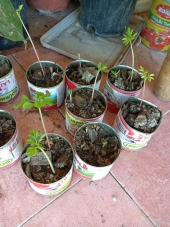
 4
4




It's never too late to start gardening, and even the smallest project is worthwhile.
 7
7




14ac Central California foothills, up for collaboration in Central CA

 5
5




Works at a residential alternative high school in the Himalayas SECMOL.org . "Back home" is Cape Cod, E Coast USA.
 5
5




I want to be 15 again …so I can ruin my life differently.

 11
11




 6
6




Invasive plants are Earth's way of insisting we notice her medicines. Stephen Herrod Buhner
Everyone learns what works by learning what doesn't work. Stephen Herrod Buhner
 9
9




 5
5




It's never too late to start gardening, and even the smallest project is worthwhile.

 11
11




 What is it that Sepp Holzer says? If you get rid of the pig, you have to do the pigs work...
What is it that Sepp Holzer says? If you get rid of the pig, you have to do the pigs work...Be joyful, though you have considered all the facts. ~Wendell Berry
 10
10




 2
2




This is all just my opinion based on a flawed memory

 3
3




pax amor et lepos in iocando




Maybe Life is always like being on a trapeze or a tightrope at the circus...
 1
1



















 1
1




 1
1




Tereza Okava wrote:Brody, I hear you. I lost a passionfruit that gave me bushels every year to ants. When we get ants here, every bit of green gets stripped, so ants can be a nightmare here.
But there are a gajillion kinds of ants, and they all seem to be after different things, so I think we all have different experiences with ants. The ants that killed my fruit still seem to live in my garden, but now they go after different things. I think ants are a great permaculture tool for teaching observation- I only found out there was a rotten spot on my vine after the ants starting going for it. Maybe if you can find out what they want and give it to them elsewhere (greens to rip up and bring back to their nests? Sweet stuff [the honeypot idea]) you can distract them. I find the same is true with slugs, if I set up a nice pile of decaying leaves in one corner of the yard and only use super dry mulch in my beds, they will start moving to where the eats are better.
I generally try to annoy them into moving when I can-- rake up their nests, dump hot water in to their hills-- and keep on it, because they have much more of a labor force than I do!!!
Maybe Life is always like being on a trapeze or a tightrope at the circus...
 1
1








greg mosser wrote:brody, as noted earlier, there are many, many kinds of ants, so ‘black ants’, while that might be what they’re called locally, doesn’t really tell us what species you mean. but many ants do keep plants from growing in the immediate vicinity of the hill, partly because the plants interfere with how they manage the temperature and humidity of the colony. you mention planting ‘in and around’ their hill…that makes me think the colony is relatively large, and in your location, perhaps a Formica species, which, yeah, planting into the colony itself probably won’t have good outcomes. is that the only spot you’ve got for a garden? if there seem to be plenty of the ants around in other places, i wouldn’t personally feel too much remorse if i had to remove a colony if it was in my only growing space. but if you can plant farther away, and it turns out they leave the plants alone then…probably the better option in my eyes.
 1
1




Tereza Okava wrote:is there anything scarier than signs of carpenter ants or termites in your home? probably not! been there done there with that too... thank goodness it was a rental house and we left it in the rearview mirror!
when it's rainy i need to go hunt the slimy little schmucks at night, and I use no mulch at all. We seem to have crossed from wet into dry season now, so I can start adding some dry mulch back, but I spend half the season with bare ground because it gets so out of control (I grow a lot of leafies, and it's usually rainiest in the fall when my winter greens are just getting started, so I need to minimize damage).
Maybe Life is always like being on a trapeze or a tightrope at the circus...

|
Warning! Way too comfortable! Do not sit! Try reading this tiny ad instead:
Learn Permaculture through a little hard work
https://wheaton-labs.com/bootcamp
|




